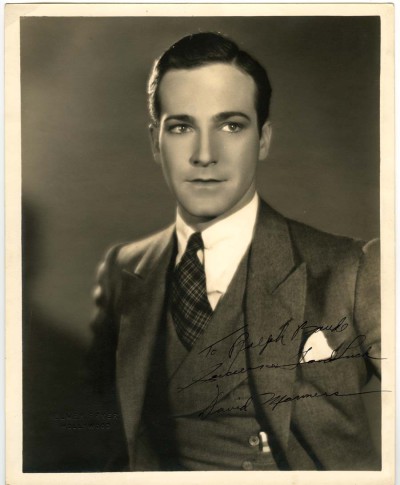David Manners (David Joseph Manner)

Manners was born Rauff de Ryther Duan Acklom in Halifax, Nova Scotia, the son of British parents, Lilian (Manners) and writer George Moreby Acklom, and the nephew of military figure Cecil Ryther Acklom. Manners originally studied forestry at the University of Toronto, but he found it boring. Over his father’s objections, he pursued a stage career and appeared in both Broadway and out-of-town productions. He came to Hollywood at the beginning of the talking films revolution after studying acting with Eva Le Gallienne, even though she had remarked that he was “a very bad actor” after seeing one of his stage performances. He once appeared on stage with Helen Hayes. His family moved to New York City in 1907, and to Hastings-on-Hudson, New York in 1922. Manners was serendipitously “discovered” by the film director James Whale at a Hollywood party, and within a few years, he was a popular leading man, playing opposite such actresses as Katharine Hepburn, Barbara Stanwyck, Gloria Stuart, Myrna Loy, Loretta Young, and Ann Dvorak. He was paired several times with Helen Chandler. His first film, directed by Whale, was destroyed before having been released, but with his second movie, Journey’s End (1930), The New York Times and Variety officially bestowed their imprimatur upon the fledgling film actor. His subsequent film appearances in movies made at RKO Radio Pictures and Warner Brothers were critically praised (again including The New York Times, an early and prescient adherent of his acting abilities), and he was contracted by the latter studio. In late 1930, he filmed his best remembered role, as Jonathan Harker opposite Bela Lugosi, in Universal’s horror classic, Dracula (1931). Until the end of his life, Manners continued to receive fan mail from fans of the movie, although he claimed to have never seen the finished film. In his tenth movie, he co-starred with Barbara Stanwyck in Frank Capra’s critically acclaimed but commercially unsuccessful The Miracle Woman (1931). The New York Times, again lauding Manners, featured this tribute, “Manners does exceptionally well with this sympathetic assignment”.
During his brief tenure at Warners, which loaned him to other studios quite frequently, Manners progressed from callow featured actor and leading man to finally attaining star stature with the lead in Crooner (1932). Shortly thereafter, he began to freelance with much success. One of the final films he made before the termination of his Warner Bros. contract, was RKO’s A Bill of Divorcement, starring John Barrymore and Billie Burke. Katharine Hepburn, who made her debut in the same film, once commented that “David was a big star. I was so nervous working with him … He was… just a dear to work with and a totally professional and talented actor.” Lucille Ball, a costar in Roman Scandals, commented, “David wasn’t in the one scene I did in Roman Scandals, but he watched every scene shot. He was tremendously enthusiastic, and he…invited me to supper. … He was mobbed everywhere. All the time he kept telling me I had style and personality. He said if I persevered I’d get somewhere in Hollywood. Not once did he ever hint that he’d like to take me home to his boudoir. … He was so utterly charming.” Many studios vied for his talent and services besides RKO and Warner Brothers, including Columbia, Universal, Paramount, Fox Film Corporation, Tiffany Pictures, and United Artists. Manners died in Santa Barbara, California on December 23, 1998 at age 98, having outlived his long-term partner, Bill Mercer, who had died twenty years earlier. His ashes were scattered at Rancho Yucca Loma.
Born
- April, 30, 1900
- Canada
- Halifax, Nova Scotia
Died
- December, 23, 1998
- USA
- Santa Barbara, California
Cause of Death
- natural causes
Other
- Cremated



